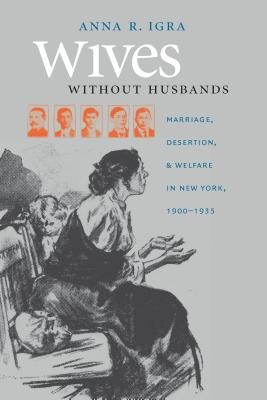
- We will send in 10–14 business days.
- Author: Anna R Igra
- Publisher: University of North Carolina Press
- ISBN-10: 0807857793
- ISBN-13: 9780807857793
- Format: 14.7 x 23.4 x 1.1 cm, softcover
- Language: English
- SAVE -10% with code: EXTRA
Reviews
Description
Shedding new light on contemporary campaigns to encourage marriage among welfare recipients and to prosecute "deadbeat dads," Wives without Husbands traces the efforts of Progressive reformers to make "runaway husbands" support their families. Anna R. Igra investigates the interrelated histories of marriage and welfare policy in the early 1900s, revealing how reformers sought to make marriage the solution to women's and children's poverty.
Igra taps a rich trove of case files from the National Desertion Bureau, a Jewish husband-location agency, and follows hundreds of deserted women through the welfare and legal systems of early twentieth-century New York City. She integrates a broad range of topics, including Americanization as a gendered process, breadwinning as a measure of manhood, the relationship between consumer culture and social policy formation, the class dimensions of family law, and the Jewish community as a source of welfare policy innovation. Igra analyzes the history of antidesertion reform from its emergence in social policy debates, through the establishment of domestic relations courts, to Depression relief programs. She shows that early twentieth-century reformers, by attempting to make instrumental use of poor people's intimate relations, anticipated welfare policies in our own time that promote marriage as an answer to poverty.
EXTRA 10 % discount with code: EXTRA
The promotion ends in 5d.07:43:51
The discount code is valid when purchasing from 10 €. Discounts do not stack.
- Author: Anna R Igra
- Publisher: University of North Carolina Press
- ISBN-10: 0807857793
- ISBN-13: 9780807857793
- Format: 14.7 x 23.4 x 1.1 cm, softcover
- Language: English English
Shedding new light on contemporary campaigns to encourage marriage among welfare recipients and to prosecute "deadbeat dads," Wives without Husbands traces the efforts of Progressive reformers to make "runaway husbands" support their families. Anna R. Igra investigates the interrelated histories of marriage and welfare policy in the early 1900s, revealing how reformers sought to make marriage the solution to women's and children's poverty.
Igra taps a rich trove of case files from the National Desertion Bureau, a Jewish husband-location agency, and follows hundreds of deserted women through the welfare and legal systems of early twentieth-century New York City. She integrates a broad range of topics, including Americanization as a gendered process, breadwinning as a measure of manhood, the relationship between consumer culture and social policy formation, the class dimensions of family law, and the Jewish community as a source of welfare policy innovation. Igra analyzes the history of antidesertion reform from its emergence in social policy debates, through the establishment of domestic relations courts, to Depression relief programs. She shows that early twentieth-century reformers, by attempting to make instrumental use of poor people's intimate relations, anticipated welfare policies in our own time that promote marriage as an answer to poverty.


Reviews